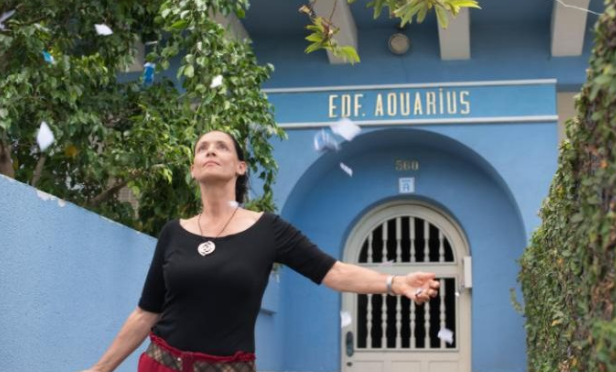In an age during which it’s lauded to eradicate the old and embrace the new (regardless of its lack of quality), the trend in real estate favoring the demolition of original buildings in favor of condos and other types of luxury buildings is only par for the course. But what one construction management company didn’t account for was Clara (Sonia Braga), a willful, steadfast resident in the Aquarius (now you see where the film’s title comes from) who assures Diego (Humberto Carrão), the overseer of the “project,” that the only way she’ll leave is dead.
Set in Recife, Brazil, this is more than a tale of a David and Goliath nature. At its core, Aquarius is a story of familial bonds and the power of sentiment attached to objects–particularly those passed down through generations. The initial part, titled “Clara’s Hair,” of Kleber Mendonça Filho’s tenth feature takes place in 1980 (the same year Queen’s “Another One Bites the Dust” came out, which Clara plays to 1) establish for the audience what year it is and 2) emphasize her intrinsic love of music that later leads her to become a journalist). As Clara secrets away to the beach near the Aquarius, where her Tia Lucia (Thaia Perez) is having her seventieth birthday party, we get a sense of her rebellious spirit right from the outset as she smokes weed with gusto and talks with her brother’s girlfriend.
It is later, when she returns to the party with the others that we learn from a speech given by her husband that she has only recently overcome a battle with breast cancer. But before this, we’re given the first inkling of Mendonça Filho’s impressionistic flashbacks as Tia Lucia listens to her great niece and nephew deliver a heartfelt timeline of her life. While letting it wash over her, her eyes fix on a dresser nearby. Visions of being eaten out on the dresser while in college establish its importance in always tying Tia Lucia back to a pleasurable moment of her youth. As a short-haired Clara looks on at Lucia with pride, the scene concludes with the shot of the dresser, which then fades to the present day, where the dresser remains in the exact same place in what has now become Clara’s apartment, commencing the segment “Clara’s Hair,” which we see quite a bit of as she puts it up into a ponytail before leaving. The presence of the dresser looms large, its essence a testament to her honoring of the past and the energy a piece of furniture passed down through the ages can emanate.
In addition to the dresser, the contents of Clara’s apartment hold the key to her heart in many ways, especially her record collection, which she seems to cherish second only to her photo albums. While being interviewed about her upcoming book, she stresses that she enjoys music in all the mediums it has taken on, but that there is more substance–potential for caring–in the tangible.
With this in mind, it’s no surprise that she would be unbendable with regard to selling her apartment to Diego, who continuously shows up to her place with his grandfather (the crony of the company) to suggest she leave. When it becomes evident she’s content to live in what her daughter, Ana Paula (Maeve Jinkings), calls a “ghost building,” with her maid, Ladjane, Diego seemingly backs off, instead opting for more passive aggressive ways to get to her.
Throughout her struggle to feel at home in her own apartment as pressures mount, the specificity of her things–from the Barry Lyndon movie poster to the Jazz record by Queen she puts on to drown out the sound of a porno movie being made above her–is what stands out. This apartment is a character of its own with a past as abounding and vital as any human’s.
It’s the nuanced details of Aquarius that make it so rich–so rife with meaning in every single frame, including a scene of Clara visiting her husband’s grave, then passing by another part of the cemetery to see a pair of groundskeepers removing a skeleton from one of the plots. This haunting image, again, goes back to how quick everyone is to replace that which they deem no longer useful–of no importance. Luckily, there are still people like Clara–however few and far between–willing to fight against the force of others in the position to obliterate whatever strikes their fancy.





















